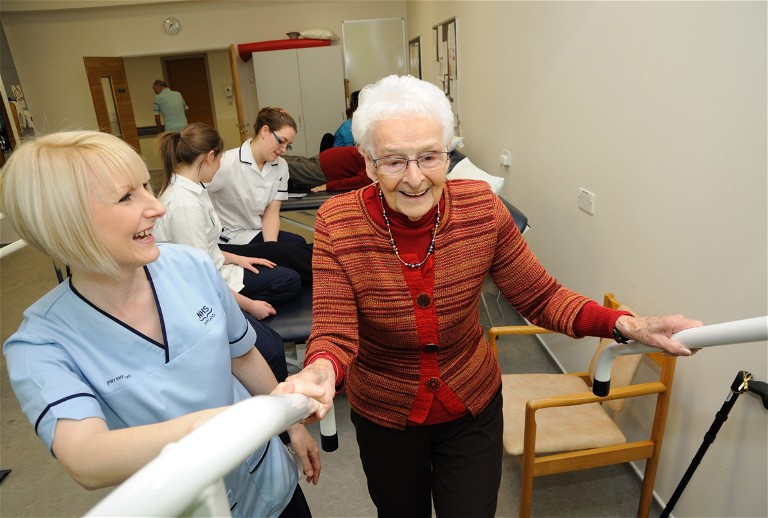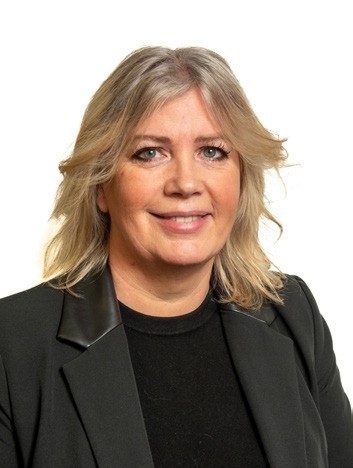Digital innovations: reducing the pandemic of frailty
Innovation can play key role in Scotland’s fight to reduce ‘pandemic of frailty’
Frailty should not be considered an inevitability, but the effects can be significant. How can technological innovations combat this?
Frances Ramsay at InnoScot Health
Frailty should not have to be considered an inevitability – but if allowed to take hold and its progress goes unchecked, then the effects can be significant.
Events such as a fall or loss of mobility can typically act as a trigger for a reduction in mental or physical resilience, meaning less ability to bounce back from further events, in turn potentially leading to difficult later years and poorer health outcomes.
While frailty is most associated with older people, it’s not defined by age and can also apply to younger people living with chronic conditions. It in fact covers a range of disease and clinical specialities and there is a pressing need to pivot the country’s approach to frailty as part of continued work to recover and modernise health and our social care services.
Of the many healthcare issues that have had a strong light shone on them in recent times, frailty remains high on the list of concerns.
As well as health-related problems, several social factors, such as social isolation and deprivation, can increase the likelihood of someone becoming frail – and after Scotland’s population was instructed to stay at home for prolonged periods to avoid COVID-19, society’s most vulnerable, frail members in turn found themselves at greater risk from unplanned hospitalisation, disability, cognitive impairment and more. Indeed, approximately 35% of the Scottish population over the age of 65 is identified as mildly frail, 15% moderately frail and 5% severely frail.
Last year, Professor Jann Gardner, chief executive of NHS Lanarkshire, said: “Our system was designed to be effective for healthcare needs in 2019, but we need to acknowledge that healthcare needs have changed and are significantly different in 2023. That relates to complex care needs and our population coming forward with frailty issues and broader chronic condition issues.”
Laura Skaife-Knight, chief executive of NHS Orkney, echoed that sentiment: “We are forecasting a significant demographic shift over the next decade […] a 35% increase, between 2020 and 2035, in those over the age of 65. The number of people over the age of 85 will double, which is significant. We need to start not just solving the issues that we face now but planning for the future.”
As is increasingly the direction for the future of all healthcare, proactivity is now absolutely key to reducing frailty’s impact.
A major piece in that puzzle is the population avoiding a sedentary lifestyle – remaining active, particularly through basic activities such as regular walking or targeted exercising with a view to building better strength and balance in later life – but progressive, ever-evolving healthcare approaches have a role to play too.
These must encompass dignity and empowerment and ensure that individual voices are being listened to and needs met. Often that means remaining in the community – whether living independently or with family – and solutions shaped around person-centred care, allowing them to take control of their own health choices. That’s where fresh thinking can play its part.
Against a challenging backdrop of renewal and transformation and claims of an ‘epidemic of frailty’ accelerated by the pandemic, NHS Scotland must therefore look to leverage new ideas from all levels of the workforce that are increasingly doing more with less – ideas generated by those very staff who know the issues inside out and have the knowledge and experience to identify the correct approaches.
Dawn Skelton, professor of Ageing and Health at Glasgow Caledonian University, Scotland, spoke last year of her belief that the social restrictions of successive lockdowns had contributed to a steep rise in frailty. However, while she noted that the NHS Scotland workforce is “seeking solutions” – with falls and fractures among older adults “on the increase quite considerably” – it is clear that with the right support, staff determination can be channelled into effective, lasting change.

Professor Skelton said of NHS Scotland’s 160,000-strong workforce: “In their working day, they live and breathe the increase in frailty of older people three years on from that first prolonged lockdown. […] The continued shielding, lack of routine, long-term condition management and social isolation have had a huge effect on older people’s physical function and the ability to maintain independent living. […] This, coupled with the considerable staffing issues across health and social care, mean that services are now struggling with a rehabilitation pandemic.”
Professor Skelton called for “proper, effective interventions”; a lot of those already exist, but more are needed during this vital time and must be carefully integrated where they can be most effective. Put simply then, we need to accelerate dedicated frailty-targeted innovation and transform the quality of people’s lives while helping NHS Scotland adapt to changing demographics and an increase in service use.
There are major challenges ahead with an ageing population and Scotland’s future depends on true innovation from the professionals in the field who understand the challenges of looking after people with chronic health conditions. NHS Scotland is united in the view that frailty is a very broad area – stroke, COPD, orthopaedics, ophthalmology – but with huge scope for new ideas and innovations to be developed.
Responding to the challenge of frailty, Dr Iain Morrison, a GP at Newbattle Practice in Midlothian, implemented MidMed – a dedicated GP-led service for their patients living at home with moderate or severe frailty as identified by the electronic Frailty Index.
He said: “Frailty is one of the greatest challenges the NHS in Scotland faces because of the changes to the national demographic. We all need to be thinking differently about how we respond to these challenges. […] This might be a change in service such as the MidMed project we have implemented; but it might be an idea for a medical device, educational tool or piece of technology that helps people live longer with age and more complex health conditions. It is encouraging to see health and social care professionals being supported to come forward with new and innovative ideas to support this growing population.”
Indeed, there are opportunities alongside the challenges – not only to make lives better, but also to realise time and cost savings that can then be redeployed back into the NHS. At a time when NHS resources are limited, Scottish innovators have the power to target at-risk individuals at an early stage with evidence-based interventions that can manage or reverse their conditions. This in turn reduces the likelihood that they will need to access unplanned services due to a crisis, thereby reducing the use of expensive, unscheduled care and reducing hospital readmissions.
In 2022, a survey of the NHS Scotland workforce was conducted independently, finding that remote monitoring was seen as a key area of ongoing innovation for 86% of staff. In terms of innovation priorities, it placed third (45%) behind only big data and analytics and digital apps.

Last year, Inhealthcare partnered with NHS Scotland to scale up remote monitoring pathways including blood pressure monitoring, hypertension and chronic pain management as part of NHS Scotland’s Connect Me programme, allowing patients to interact and communicate with healthcare professionals through the use of mobile apps, text messages and automated phone calls.
With the larger roll out underpinned by Inhealthcare’s digital health platform, it is expected that more patients will be able to self-manage their health needs safely and confidently at home and spend less time travelling to appointments. Last year too, it was reported that digital healthcare company PneumoWave had secured £5.2m of funding from the Scottish National Investment Bank thanks to its remote patient monitoring technology for identifying potentially fatal respiratory changes.
It is evidently a burgeoning area of homegrown innovation, and patients are ultimately reaping the benefits with technology being a key enabler. Increasingly, it can provide a range of remote benefits – from monitoring the effects of starting and stopping treatments, to providing important notifications and reminders, as well as offering advice and support. Like all effective technologies though, they work best when human management and interaction are placed to the fore. Likewise, NHS Scotland can be enhanced by technological breakthroughs, but they will remain supplementary to human skill and ingenuity.
Workforce innovators have the power to maximise limited NHS Scotland resources by targeting simple or complex ideas that make best use of what they already have in abundance – insight and experience. Furthermore, while patients are reaping the benefits of innovation, it requires staff who understand the issues firsthand for it to be embedded properly. Those knowledgeable workers must be encouraged to help tackle the country’s growing frailty problem by coming forward with new ideas and co-developing innovations that can help people live better in later life or cope with long-term health conditions.
NHS Scotland staff from any health board and any role or medical discipline can be an innovator, representing true empowerment for those who need it most.
Fundamentally, it is all about improving quality of life while supporting NHS Scotland to adapt to changing demand for services, and current challenges – whether that be through concept, technology, device or service, harnessing the wide spectrum of our talented health and social care professionals.

Frances Ramsay has been working within the health service since leaving school when she started her nurse training qualifying in 1991. Her background is within acute care and she has experience within both NHS Scotland and England having worked in the John Radcliffe teaching hospital in Oxford, UK. Frances joined the medical device industry as a clinical nurse specialist working in an education capacity, both advising on and helping research projects. Her interest in developing products and working closely with key clinical leaders has since helped to commercialise products. Most recently, Frances has worked as innovation manager at InnoScot Health.